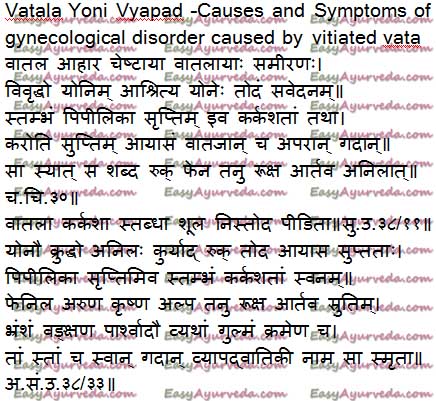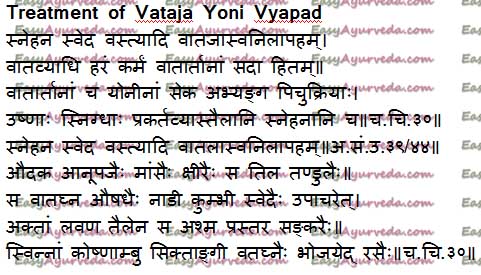Vatala Yoni Vyapad – Causes, Symptoms, Treatment
By Dr Raghuram Y.S. MD (Ay) & Dr Manasa, B.A.M.S
Vatala (Vatika) Yoni Vyapad is a gynecological disorder caused by vitiated Vata dosha.
Table of Contents
Causes
Specific causes of vatala yoni vyapad
Consumption and regular indulgence of vata aggravating foods and daily activities by a woman having vata type of body constitution causes aggravation of vata.
Read – Diet And Lifestyle Advice For Vata Dosha Body Type
Pathogenesis
When a woman of vata prakriti consumes food and indulges in other activities which aggravate vata, the vata gets aggravated. This aggravated vata reaches the reproductive system of the woman, produces troublesome symptoms and causes vatal yoni vyapat.
an of vata prakriti consumes food and indulges in other activities which aggravate vata, the vata gets aggravated. This aggravated vata reaches the reproductive system of the woman, produces troublesome symptoms and causes vatal yoni vyapat.
Sanskrit verse


Symptoms
Symptoms of Vatika Yoni Vyapad –
Local symptoms related to reproductive system, mainly vagina and uterus
Toda – pricking pain in the vagina and uterus
Vedana – pain in the genital system, lower belly (ati vedana – Bhava Prakasha – i.e. severe pain in comparison to other gynecological disorders)
Stambham – stiffness in the vagina and uterus
Pipeelika sruptim iva – feeling as if the ants are creeping over the body (afflicted parts)
Karkashataam – roughness in the genitals
Suptim – numbness in uterus and vagina
Aayama – feeling of stretching in the vagina and uterus
Bhramsha – displacement of vagina and uterus
Yoni swana – sounds from vagina, vaginal flatus
Vankshana vyatha – pain in the groin
Parshva vyatha – pain in the flanks
Read – Vata Disorders (Vatavyadhi): Definition, Causes, Symptoms
Generalized symptoms pertaining to whole body caused by vitiated vata
Aayasa – fatigue
Vataja rogas – manifestation of many other vata disorders. Vagbhata too mentions that gulma i.e. abdominal tumor etc vata disorders are produced gradually in due course of vatala yoni vyapad.
Nature of Menstrual Bleeding
In Vatil Yoni Vyapath, the menstrual blood will have the below mentioned features –
Sa shabda – the menstruation occurs with sound, there is sound during bleeding
Sa ruk – menstruation is associated with severe pain
Sa phena – frothy bleeding
Tanu artava – menstrual blood is thin i.e. dilute, looks like diluted blood
Ruksha artava – menstrual blood is dry in nature, devoid of mucus
Alpa artava – scanty menstruation
Aruna Krishna varna – the blood will have blackish or pinkish appearance
Chakrapani, the commentator of Charaka Samhita has explained that this type of bleeding from the vagina occurs in vatala yoni vyapad may occur even during inter-menstrual period. He also tells that this disorder resembles another pathological condition i.e. bleeding disorder caused by vitiated vata i.e. vataja asrgdhara i.e. excessive bleeding due to aggravated vata.
Read –Symptoms Of Vata Dosha Increase And Imbalance – Vata Vruddhi Lakshana
Modern correlation
Analytical view of Vatala Yoni Vyapad
Symptoms of estrogen deficiency – Symptoms like stiffness, roughness, hyperaesthesia and anaesthesia explained in vatala yoni vyapad by almost all authors resemble the symptoms of estrogen deficiency.
Symptoms of vaginal neuralgia – The pain and related symptoms of vagina and uterus which is the predominant symptom of vatala yoni vyapad according to all authors can be correlated to a psychological disorder called vaginal neuralgia.
Symptoms of lax perineum – Displacement of uterus and vaginal flatus explained by Vagbhata resembles the symptoms of lax perineum associated with estrogen deficiency.
Endometriosis – If the term Yoni is taken as uterus instead of vagina, the vatala yoni vyapad can be correlated to endometriosis due to the similarity of symptoms in both conditions.
In endometriosis there is pain due to endometrial deposits in the uterine ligaments, there is excessive menstruation associated with pain and frothy blood, there is enlargement of uterus, hard or rough in consistency and occasionally stiff or immobile due to deposits on ligaments.
The psychological upset subsequently leading to experience of anaesthesia or hyperaesthesia may be contributed to the chronic nature of the disorder.
Considering the description of all the authors (classics) and summing them together, vatala yoni vyapad can be considered and compared to endometriosis associated with laxity of perineum.
Read –Shatavari Asparagus racemosus Uses, Research, Side Effects
Treatment
Treatment of Vatala Yoni Vyapad
Vatala Yoni Vyapad is chiefly treated through administration of oleation, sudation, vasti i.e. medicated decoction and oil enemas, uttara vasti i.e. enemas through vaginal or urethral route and parisheka i.e. pouring of medicinal liquids over the afflicted areas. All treatments, diets and activities which alleviate vata should be administered in the treatment of vatala gynecological disorder.
Read Gynecological Disorders Causes, Types As Per Ayurveda
Treatment principles
Treatment of Vataja Yoni Vyapad
The principles of treating the gynecological disorders caused due to vitiation of vata are –
- Controlling the vata by administering vata alleviating treatments and measures including oleation, sudation and medicated enemas.
- All forms of vata destroying measures, treatments, activities, medicines and food should be followed.
- Oils or lubricating fats prepared and processed with hot and unctuous herbs should be used for purpose of local irrigation, massage and Pichu (tampons).
- Oleation with Traivrata Sneha i.e. combination of ghee, oil and muscle fat
- Various types of sudation
- Use of meat soup prepared from wild animals, aquatic animals and animals living in marshy areas
- Enema using milk medicated with dashamula
- Oral consumption of milk prepared with dashamula
- Anuvasana vasti i.e. oil enema with traivruta sneha
- Uttara vasti i.e. uterine or vaginal instillation of unctuous enema with traivrita sneha
Read – Diet And Lifestyle Advice For Vata Dosha Body Type
Sweating treatment
Sudation in Vatala Gynecological Disorder
Kumbhi sweda i.e. sudation with an ewer filled with herbal decoction etc liquids or Nadi Sweda i.e. tubular sudation should be provided to the patient suffering from Vatala Yoni Vyapad using any one of the below mentioned enema recipes –
- Meat soup of aquatic animals
- Meat soup of animals living in marshy land
- Milk mixed with sesame seeds and broken rice pieces
- Decoction of herbs capable of suppressing the vata
Read –Prastara Sweda – Samstara Sweda Meaning, Types, Examples, Uses
Alternatively one or the other below mentioned sudations shall be administered after anointing the yoni with salt and oil –
- Ashma sweda – heated stone sudation
- Prastara sweda – heated rock sudation
- Sankara sweda – sudation with heated ball of herbs either wrapped or unwrapped in the cloth
- Pinda sweda – sudation with heated ball of drugs
- Nadi Sweda – tubular sudation or
- Kumbhi Sweda – Ewer or pitcher sudation
Read – Nadi Sweda – Tube Sudation Method, Types, Examples, Uses
After sudation-
- Bath should be given with warm water, followed by
- Diet mixed with either meat soup processed and medicated with vata suppressing herbs or meat soup of wild animals as food
Pichu
Pichu (Tampons) in Vatala Yoni Vyapad
Guduchyadi Taila Pichu –
The tampon of oil prepared from the below mentioned herbs should be used by the woman suffering from Vataja gynecological disorders –
- Guduchi – Tinospora cordifolia
- Malati – Jasmine
- Rasna – Pluchea lanceolata
- Bala – Sida cordifolia
- Madhuka – Licorice
- Chitraka – Plumbago zeylanica
- Nidigdhika – Solanum xanthocarpum
- Devadaru – Cedrus deodara and
- Yuthika – Jasmine
1 prastha or 768 grams approximately each of the above mentioned herbs should be mixed along with 1 prastha of oil and 2 prastha each of cow urine and milk to prepare the oil. This Guluchyadi Taila should be used for administering tampon.
Read – Local Pichu Treatment For Painful Joints, Ligaments And Muscles
Paste application
Kalka Dharana or application of paste in Vatala gynecological disorder
Luke warm oil should be used to anoint vulva or vagina of the woman suffering from vatala yoni vyapad. After this, the paste of himsra should be applied locally.
Read –Ayurvedic Herbal Pastes – Kalka Uses, Preparation, Examples
Basti treatment
Basti – herbal enemas in vatala yoni vyapad
Guduchyadi oil or oil processed with juice or decoction of sour herbs should be used to administer enema as vaginal instillation.
Read –Basti treatment procedure, Benefits- Astangahrudayam Sutrasthana 19
Herbal ghees
Ghrita Pana – medicated ghee in vatala yoni vyapad
Kashmaryadi Ghrita Pana – 1 prastha ghee should be cooked with 12 grams quantity each of the below mentioned herbs.
- Kashmari – Gmelina arborea
- Triphala – fruits of Terminalia chebula, Terminalia bellirica and Emblica officinalis
- Raisins
- Kasamarda – Cassia occidentalis
- Parushaka – Grewia asiatica
- Punarnava – Boerhavia diffusa
- Turmeric
- Daru haridra – Berberis aristata
- Kakanasa – Asclepias curassavica
- Sahachara – Barleria prionitis, Nilgirianthus ciliatus
- Shatawari – Asparagus racemosus
- Guduchi – Tinospora cordifolia
This ghee should be orally consumed. It cures all gynecological disorders caused by vitiated vata and also increases fertility, bestows progeny.
Read –
The same Ghrita has been explained by Vagbhata wherein he has mentioned Shatavari as the first herb in the list of medicines used for preparing ghee. On this basis it can be named as Shatavaryadi Ghrita (formulations are often named by the first herb mentioned in the list).
Click to Consult Dr Raghuram Y.S. MD (Ayu) – Email / Skype








One comment
Vaidya Radha priya
Namaste
In endometriosis as u have mentioned, the will be heavy bleeding, it’s not ekadoshaja condition, it’s sannipathaja condition where u can see all thridoshic symptoms.